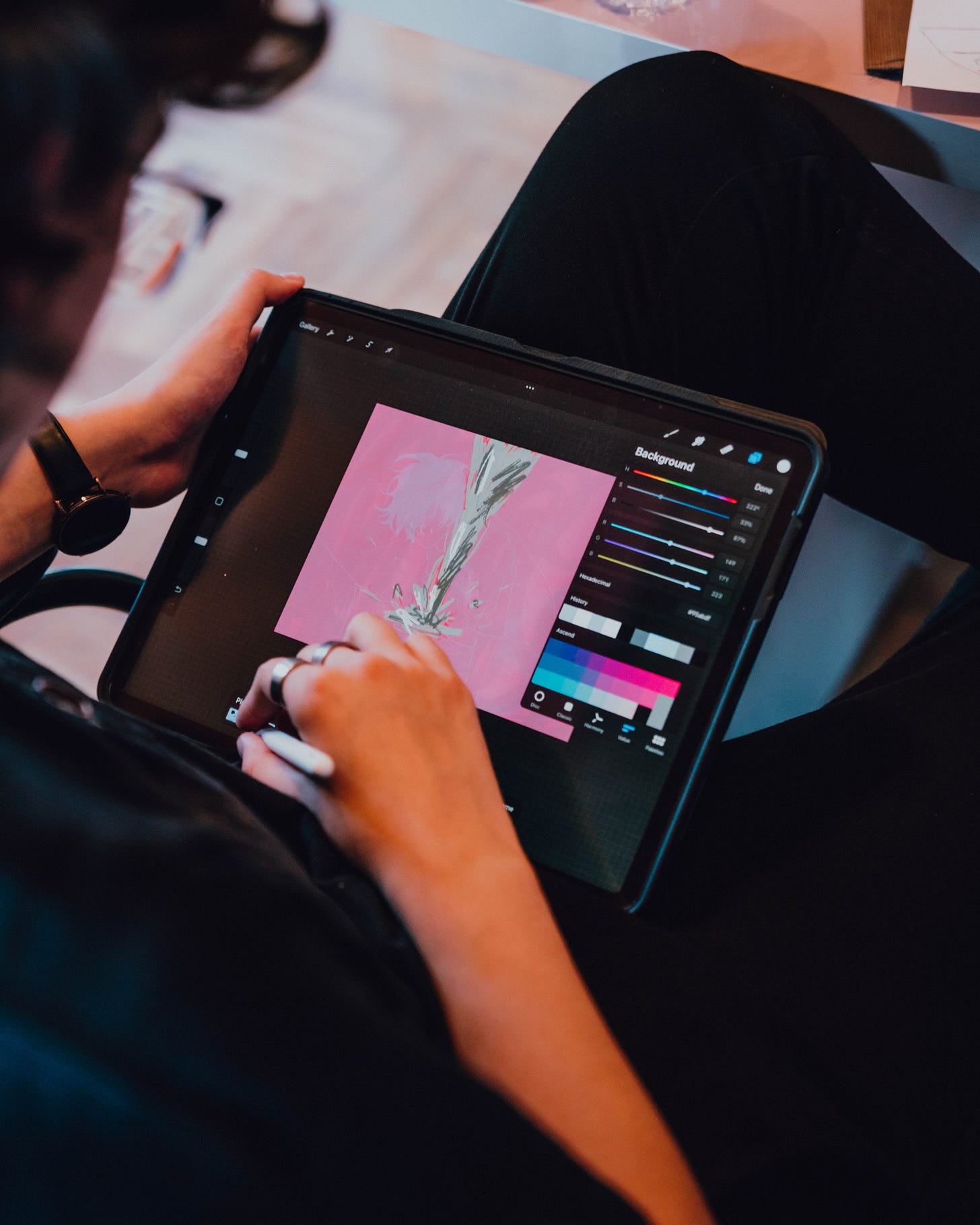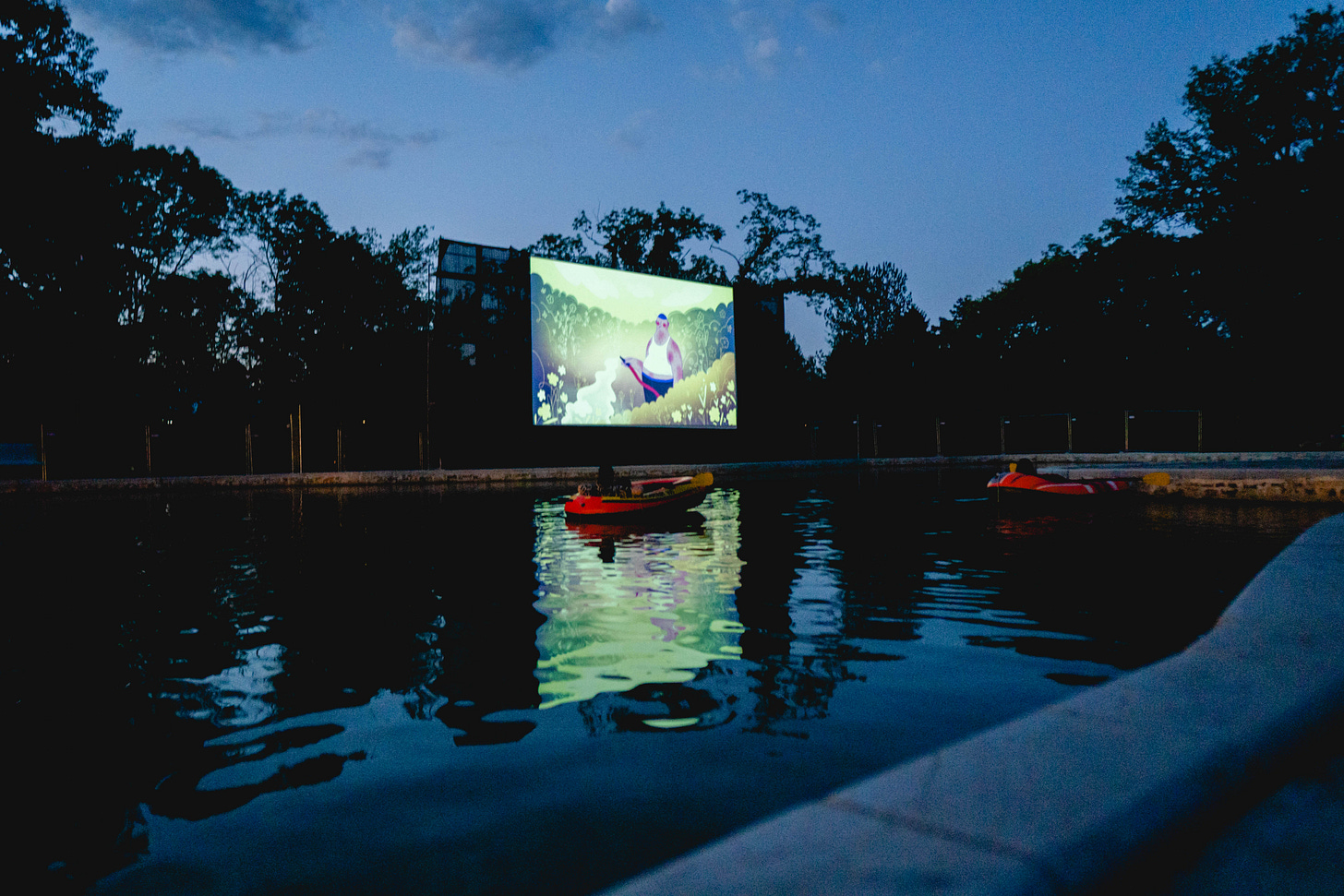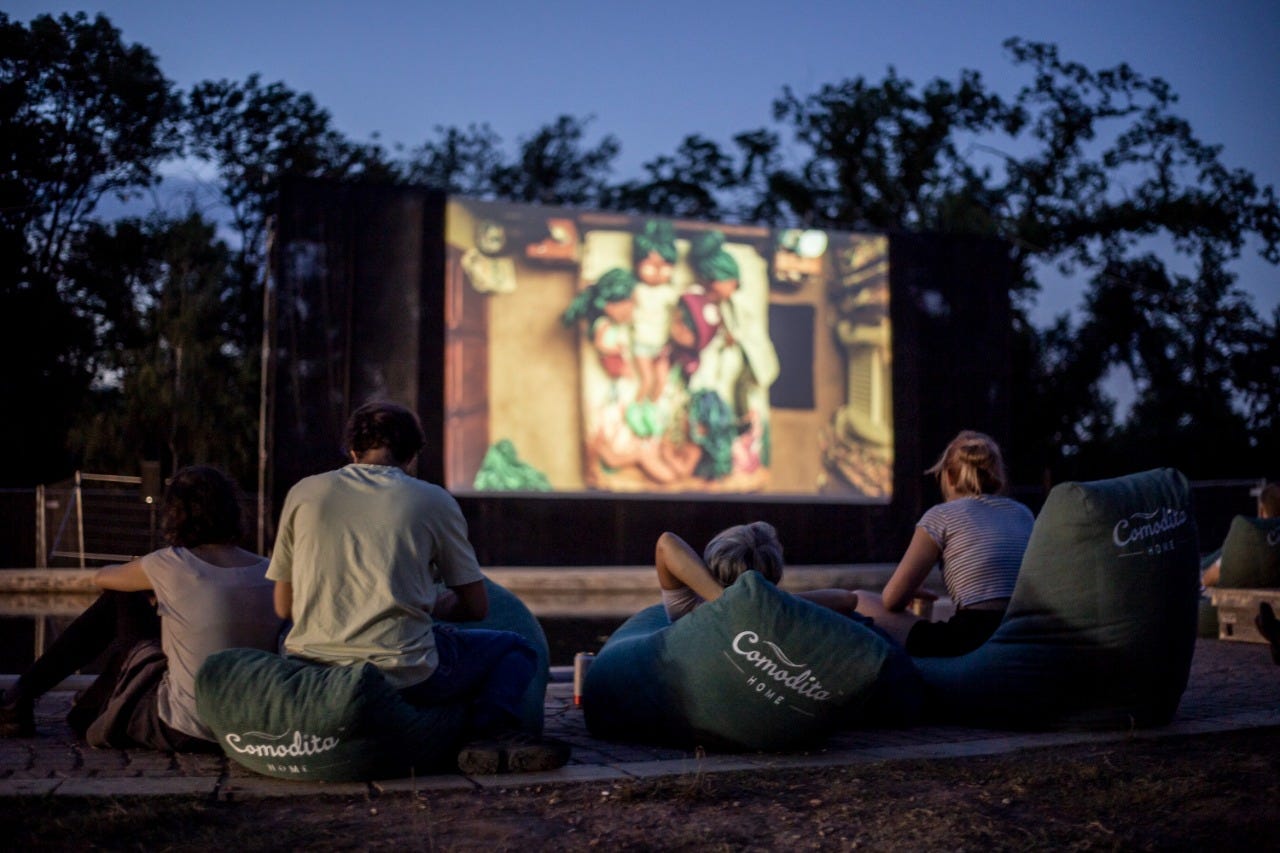S3E21. Animation Festival breaking barriers
Founded in Kosovo in 2010 by a group of 18-year-olds, Anibar has now become one of the biggest animation festivals in whole Europe. Interview with director Arba Hatashi on the eve of the 14th edition
Hi,
welcome back to BarBalkans, the newsletter (and website) with blurred boundaries.
The energy of young people cannot be caged. When they have a revolutionary idea and believe in it with all their strength, there is no limit that can hold them back.
It has been like this since the dawn of time, in any context, at any latitude. The rhetoric “today’s young people don’t want to roll up their sleeves” is only the expression of the frustration of one who has never known how to dare.
And the more limiting is the context, the more explosive is the force.
It can happen in any area of life. In politics, sexuality, sports, culture and art.
This is how - in a city in Kosovo with less than 50 thousand people - it was possible for a group of young people to start an animation festival out of nowhere. And this has become one of the most important festivals in entire Europe in just a few years.
With no specialized education available, in a country isolated from the rest of the continent (until the end of 2023), where it is very difficult to create a network of foreign contacts. With no experience, with no freedom of movement.
Today, we have the opportunity to discuss about it with Arba Hatashi, festival director of Anibar Animation Festival, on the eve of the 14th edition (July 17-23) in the city of Peja.
We talk about the Festival in an atmosphere of great enthusiasm. In Kosovo, in the Balkans, all over Europe. Among young and - we have to admit it - less young people.
Once upon a time in Kosovo
How Anibar Animation Festival started and how has it developed over the years?
«Anibar International Animation Festival started in 2010 as an initiative of a group of 18-year-olds. They wanted to learn animation, do their own productions and have access to the industry, bringing everyone to Kosovo to screen animated films.
In Kosovo there are no education institutions and opportunities when it comes to the art of animation. Especially because of the isolation and lack of freedom of movement that the country experiences.
Normally, a festival develops where there is already an animation academy. People learn how to make films and later they launch a festival to screen their productions. In Peja, we did the other way around: we launched Anibar to bring international professionals here and learn from them.
It started as a very small initiative 14 years ago and, throughout the years, it has become one of the biggest animation festivals in the Western Balkans. It was a three-day festival, while now counts more than 80 activities in a period of seven days».
Which are the main characteristics of Anibar Animation Festival?
«The Festival is gaining more and more attention by young people. In particular by the community living in Peja - the third biggest city in Kosovo - because most of the cultural activities are centralized in the capital Prishtina.
But it has also started drawing the attention of professionals and the international community specialized in animation, because of the values we try to express through all the activities, mainly in two aspects.
The first aspect is the way we present the medium of animation, giving access to cinematography and Kosovo audience and connecting them with professionals from abroad.
The second aspect is the way we produce the cultural event, providing opportunities to the community through art and activism. We always try to guarantee quality and educational activities, because Kosovo still does not have a university where to learn how to do animation».
Innovation and connections
How is the Festival structured?
«This year, we received 1513 submissions from 86 countries all over the world. In total, 128 films from 36 counties worldwide have been selected for the 7 competitive categories.
The International category is open for worldwide professionals. The Student category is a competition reserved for students who have finished producing their films during their studies or for the graduation.
We are the only festival with a Balkan competition, because we consider it necessary to give access and showcase productions coming from the Balkans.
Then, Human Rights category deals specifically with these crucial topics. The Animated Music Video category is reserved to animated music videos produced in collaboration with musicians. And finally, we have the Animated Feature Film category and the Young Audience category.
International and Kosovar professionals compose the jury for each category. Specifically for the Young Audience competition, we select students of art and film universities in Kosovo to become members of the jury.
They participate in a two-week program, where they learn how to evaluate animated films - thanks to lectures, workshops, mentors and case studies. During the Festival they watch the films and put this knowledge into practice».
In parallel, you also have a specific theme for each edition. What is it about?
«Every edition of Anibar Animation Festival is organized around a theme. Actually, it does not affect the film screening competition, which is marked by the independently and artistically chosen animated films.
The theme is the visual communication of the Festival, as we curate special programs, artistic performances and panel discussions exploring it in detail. The Festival itself becomes a platform to discuss more about that theme, while promoting the use of public spaces in the city of Peja.
It started back in 2015 with the theme of migration, that we chose because many people in Kosovo were and are living the experience of leaving the country. It followed climate change in 2016. In 2017, we opted for “reclaim the city” campaign, to promote the use of public spaces as a right for citizens.
In 2018 gender equality. In 2019 hopes and fears. In 2020, we organized an online edition, because of the COVID-19 pandemic, and the theme was people and human connections. In 2021 isolation, including the influence of the pandemic and the topic of the the lack of freedom of movement that people from Kosovo experience.
In 2022, the theme was superstitions: it was the 13th edition and it started on July 13! People from Kosovo, and from the Balkans in general, are very superstitious, we wanted to analyze this form of tradition».
Read also: S3E11. Wednesday Addams' Balkan werewolves
About this theme. What did you discover about the importance of myths, beliefs and superstitions in promoting diversity and multiculturalism?
«I think superstitions are an important theme to be discussed, because they are very present in everybody’s life in Kosovo, in the surrounding Balkan countries and all over Europe.
However, it does not receive the due space for discussion. But superstitions lead to broader topics: promoting debates on diversity and multiculturalism, the way we believe the news, how we debunk fake news.
During the Festival, we have both the local and international community engaged. In that edition, they could share experiences on how superstitions are passed on through generations, on similarities from Croatia to the Netherlands, the way beliefs are modified throughout the decades».
Read also: S3E12. The pagan spell of life and death
And which theme have you chosen for this year’s edition?
«The theme of the 14th edition will be love and connections. The diverse aspects of love and, more broadly, the celebration of all types of love».
A bright future
What is the importance of an Animation Festival and an Animation Academy in the youngest European country?
«The whole initiative started by a group of 18-year-olds, and this was crucial in a country with an average age of 24/25 year.
I think it is important that Anibar is precisely an animation festival, because this medium leaves room for interpretation and understanding of the reality by young people. And most of all, it provides engagement in socializing and learning new skills, both soft and specific skills.
Such initiatives – open and accessible, where young people can learn and grow – are quite rare in Kosovo and in the Balkans in general. It is quite tough to operate in the cultural sector here.
But I also think that this is the reason why we have such a huge impact on young people and on their high interest in participating in this Festival. We accepted 80 volunteers last year, but we received around 400 applications! For most of them, this is the first work experience or place for social engagement.
I also started as a volunteer when I was 15 years old, in the 4th edition of Anibar Animation Festival. I grew professionally and personally during the following editions. Anibar has provided me a lot of space for learning, connecting with people and experimenting, without being criticized or judged».
Read also: S3E7. The youthful energy of Prishtina
The 2024 edition will be held when visa liberalization for Kosovo citizens will be in force for the first time. What kind of effects do you see for Anibar Animation Festival?
«I think visa liberalization is going to have a huge impact on the Festival and the overall animation industry in Kosovo.
When you work for a festival, you need to visit other festivals, you need to network and exchange experiences. This is how communities grow, this is how most of the festivals operate. But it is quite hard doing it in Kosovo, because we always have to struggle with the visa process. Starting from the costs to get a visa.
In this sense, visa liberalization is going to help Anibar Festival and people who work for it. First of all to gain more access and visit other festivals, but also to develop in a more professional and quality oriented way. It will be easier for Anibar to be present at other festivals and in other markets and film related events all over Europe.
I think visa liberalization is going to have an even huger impact on the Animation Academy that we started to teach younger generations the art of animation. It will be easier to have access to European education programs for Kosovars who want to continue their studies.
Because it is very limiting when you want to dedicate your time and resources to a four-year university, and then you cannot go and talk with international professionals or visit a city to have more chances of gaining new knowledge.
Out of the 50 students that have followed the Animation Academy Program, only 20% of them have continued their studies abroad. And all of them have struggled with their visas.
Freedom of movement is a basic human right. We are not talking about a favor, this right has been delayed for too long».
Read also: S3E18. What if this is Kosovo’s Golden Year?
What are the new projects for Anibar in the near or distant future?
«Our future projects coincide with our biggest achievement so far. Through the Festival, we have started the industry of animation in Kosovo, even if it is at a very basic and informal stage.
Previously, no-one dealt with animation here. Nowadays, we have animation productions coming from Kosovo, that are supported on a national level. We are trying to facilitate connections, as we continue to see a lack of infrastructures.
This is why in the future we will work more on establishing an industry of animation in Kosovo, facilitating the growth of productions.
Through the Academy and the Festival, we have seen all the potential that we can thrive even more. It is our responsibility to do our best to support our community in this field».
Pit stop. Sittin’ at the BarBalkans
We have reached the end of this piece of road.
Today our bar, the BarBalkans, meets Anibar Animation Festival. Waiting for the 14th edition from July 17 to 23 in Peja, Hatashi gives us a preview.
«We have very good homemade grape rakija!», the festival director announces.
And she gives us appointment in July: «When you will come here, we will drink rakija together from the morning with some coffee and talks, to start the day at the Anibar Animation Festival».
Let’s continue the BarBalkans journey. We will meet again in two weeks, for the 22nd and last stop of this season.
A big hug and have a good journey!
Your support is essential to realize all that you have read. And even more.
A job well done needs many hours and energy. Also to keep BarBalkans newsletter free for everyone and to make it an increasingly original product, with new ideas, interviews and collaborations.
An independent project like this cannot survive without the support of the readers. For this reason I kindly ask you to consider the possibility of donating:
Every second Wednesday of the month you will receive a monthly article-podcast on the Yugoslav Wars, to find out what was happening in the Balkans - right in that month - 30 years ago.
You can listen to the preview of BarBalkans - Podcast on Spreaker and Spotify.
Pay attention! The first time you will receive the newsletter, it may go to spam, or to “Promotions Tab”, if you use Gmail. Just move it to “Inbox” and, on the top of the e-mail, flag the specific option to receive the next ones there.









